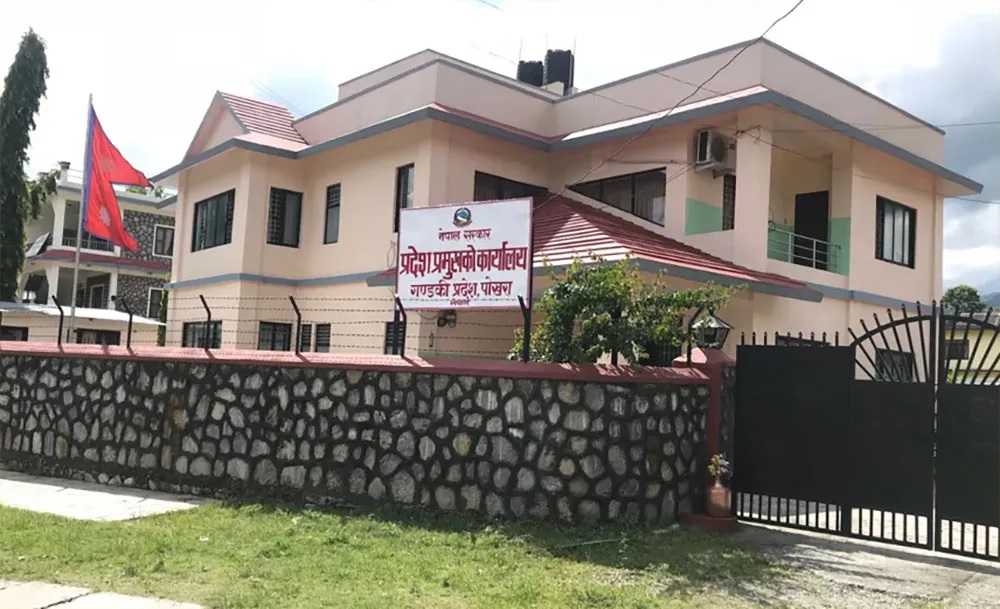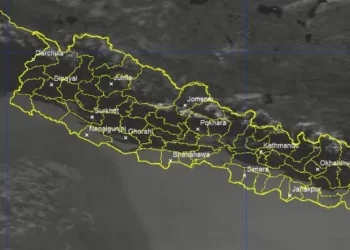POKHARA: Seven years into the federal system, public dissatisfaction with Gandaki Province’s governance is mounting—primarily due to the provincial government’s style of operation.
Although budget formulation is meant to follow structured policies and programs aligned with long-term plans, there is little to no coordination between them.
While provincial leaders and officials often claim that budgets are crafted based on federal and provincial periodic plans, the reality paints a different picture.
Instead of a systematic, priority-based allocation of resources to meet the objectives outlined in the periodic plan, budget distribution in Gandaki Province appears fragmented and politically driven.
The province’s policies and programs are framed with goals such as driving economic growth through infrastructure, energy, agriculture, tourism, and industrialization, while also uplifting the population through social security, education, and healthcare. However, execution remains weak.
Budget formulation lacks clear standards, and numerous instances have emerged where funds are allocated to projects that are either unprepared, underfunded, or excessively funded due to political pressure.
The provincial government has pledged to implement transformative and “pride” projects via public-private partnerships, but these commitments have not translated into effective action on the ground.
A recent Effectiveness Study Report on Policies and Programs of the Province, commissioned by the Gandaki Provincial Government, concluded that political interference is undermining planning.
The report states, “Leader-led decisions in prioritizing policies, programs, and projects have raised serious questions about the effectiveness and relevance of the current plans.”
Conducted by a team from Pokhara University, including Associate Professors Dr. Ajay Thapa, Dr. Hrishikesh Pandey, and Dr. Arjun Kumar Thapa, the study reviewed five years of policy implementation.
It revealed that political interests have overridden bottom-up planning. As a result, resources are scattered across too many projects, leading to diluted impact, underfunded initiatives, and low overall performance.
Ironically, although federalism was adopted to decentralize power, a centralized mindset persists in the provinces. Gandaki, critics argue, is mimicking the inefficiencies of the old central system.
The report also highlights overlapping budget allocations—some plans receive double or even triple the resources, while others are left unfunded. Monitoring and evaluation mechanisms are weak, and financial discipline is largely absent.
These shortcomings have reignited debate around the viability of the federal structure itself. Instead of addressing the system’s gaps, political parties managing the province seem to be exacerbating them.
Fragmented planning has led to environmental damage as well, with small-scale projects causing disproportionately large impacts due to the lack of social and environmental assessments.
The study criticizes the province for ignoring Sustainable Development Goals, particularly the principle of “development in harmony with nature.”
Public engagement with the province’s governance remains minimal. The report states, “With most indicators reflecting poor performance, substantial reforms are required to ensure the survival and legitimacy of the provincial system.”
Despite initiating priority projects, the Gandaki government has failed to secure adequate resources for their implementation. The study blames this on the introduction of ill-conceived, unrealistic policies and programs.
Frequent government changes have only made matters worse. While the first provincial term saw two administrations, the second has been plagued with greater instability.
This has created policy-level challenges, as successive governments introduce new programs without considering existing commitments or resource limitations.
Legislative output has also suffered. Despite more than 60 laws being enacted and some amended, the current assembly has struggled to draft essential new legislation.
Overlap with federal laws and delays in drafting provincial ones have further paralyzed governance.
Meanwhile, bureaucratic confusion caused by inter-party conflicts has deeply affected policy execution. While civil servants aim to follow structured planning methods, elected representatives frequently push for pet projects, undermining performance and institutional coherence.
As the report concludes, “Bureaucrats attempt to move forward in an organized manner, but political leaders promote agendas based on personal or party interests. This misalignment is a major obstacle to effective governance.”
Additionally, resource management and allocation continue to pose significant challenges for Gandaki Province.
Legal, procedural, and structural reforms are also advised to enable ministries to receive budget ceilings for both new and ongoing plans based on available funds.
Budget formulation lacks clear standards, and numerous instances have emerged where funds are allocated to projects that are either unprepared, underfunded, or excessively funded due to political pressure.
The province is also facing difficulties in financial management, including its inability to pay for completed projects. Compounding the issue, federal grants to the province are on the decline.
“The province’s internal revenue base is weak, and the reduction in federal grants has further intensified the challenge,” the study report states.
Procurement practices are also problematic. While existing regulations mandate awarding contracts to the lowest bidder, this has often led to compromises in quality, as cost-cutting becomes the sole criterion.
The report further criticizes the government’s pursuit of overly ambitious plans despite limited resources, which has hindered the effectiveness and balanced management of development projects.
Poor data availability adds to the problem—due to a lack of reliable and comprehensive data, it is difficult to classify and prioritize policies and programs or coordinate budget allocations across federal, provincial, and local levels.
To address these issues, the study recommends a reordering of policy, planning, and program priorities. Provinces should focus on planning, while the implementation responsibility should rest with local governments.
However, in Gandaki, the provincial government has tried to handle both, resulting in poor coordination. The report suggests that project quality should be monitored by an independent body rather than the implementing agency.
The Provincial Policy and Planning Commission is also underperforming. “The Gandaki Provincial Policy and Planning Commission does not appear to be functioning as a think tank,” the report notes.
Instead, ministries and offices should send proposed plans through the commission, which would ensure more coherent and evidence-based policymaking. Moreover, budgetary support for local governments should focus on priority projects to foster a sense of ownership.
The government is advised to adopt a more strategic approach: “Given the large volume of public demands, budget allocations should be based on well-identified needs. Once a plan or project is initiated, there should be a strong commitment to ensure its timely and successful completion.”
The report recommends that the Ministry of Economic Affairs allocate budgets strategically—ensuring the timely completion of multi-year projects, provincial pride initiatives, and transformative plans.
Legal, procedural, and structural reforms are also advised to enable ministries to receive budget ceilings for both new and ongoing plans based on available funds.
Political interference is another recurring issue. Beyond appointing ministers and distributing high-ranking posts, political parties have shown little resolve in tackling governance challenges.
The habit of favoring party loyalists while ignoring high-priority issues has weakened the system.
The report warns against the provincial government attempting to implement minor, small-budget projects. When elected representatives personally respond to public complaints by initiating such projects without adequate planning or resources, it leads to inefficiency and further complications.
The government is advised to adopt a more strategic approach: “Given the large volume of public demands, budget allocations should be based on well-identified needs. Once a plan or project is initiated, there should be a strong commitment to ensure its timely and successful completion.”









Comment